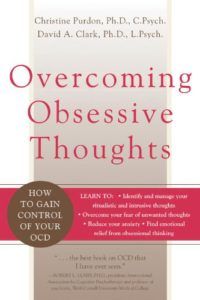Religious and Moral Scrupulosity in Christians
Listen as Ted Witzig explains various aspects of scrupulosity.
Scrupulosity is a subtype of OCD where religious and moral matters become entwined in the obsessive-compulsive cycle. People suffering with this disorder worry that they have sinned or done something immoral, even when they have not. They often seek reassurance from others and repetitive confess sins. They may have intrusive thoughts (example: “Did I repent right?”), mental images that they find disturbing (example: images of immoral acts with religious figures), fears pf blasphemous, sexual, or violent thoughts, and/or fears that they may lose control of their impulses and do something sinful or harmful (example: yelling out a cuss word in church). They may wonder if they are truly saved or if they are in danger of judgment by God. As a result, these individuals tend to repeatedly confess their sins and/or seek reassurance from others. The symptoms of scrupulosity will generally adapt to and take on the form of the person’s religious beliefs and culture. For example, Jewish individuals with scrupulosity may fear breaking kosher laws, Catholic individuals may worry about not exactly confessing each detail of something to their priest, and Protestant Christians may have pathological doubts about whether they are truly saved or whether their motives are pure (i.e., motive doubting).
ACCFS specializes in helping Christians dealing with scrupulosity. Our goal is to help not only the individual sufferers, but also the family member, friends, and ministers seeking to support them. While there are evidence-based treatments available to treat OCD and scrupulosity, many sufferers are fearful of doing the treatment and withhold themselves from it. This can sometimes occur because the individual fears that the treatment will harm their faith in Christ or because they are fearful that they really have a spiritual problem and using a psychological or medication treatment will mask the true spiritual problem. We seek to use evidence-based treatments for OCD such as Exposure and Response Prevention (ERP), Cognitive-Behavior Therapy (CBT), and Acceptance and Commitment Therapy (ACT) in a manner that is consistent with, and in support of, each person’s spiritual beliefs.
Further Information:
An Introduction to the ‘Overactive Conscience’: Understanding Scrupulosity and Obsessive-Compulsive Disorder This series of three articles describe a subtype of OCD called “scrupulosity.” This occurs when symptoms of OCD are entwined in religious and moral matters. [ACCFS]
Coping Statements for Christians with OCD and Scrupulosity
This article provides a brief set of coping statements and guidance for OCD and scrupulosity sufferers to use on a daily basis. [ACCFS]
Principles of Effective and Religiously Sensitive Exposures
This article is for individuals with OCD who are in (or are considering) treatment for OCD, especially the subtype of OCD called scrupulosity where obsessions and compulsions become intertwined in religious and moral matters. [ACCFS]
Videos about OCD
The videos at this link are of Ted Witzig, Jr. discussing the nature of scrupulosity, how it is treated, and how it is differentiated from healthy religious beliefs.
True Guilt/False Guilt
This graphic highlights the differences between true guilt and false guilt. While true guilt can be helpful if it leads us to correct wrong behavior, false guilt leads to an endless cycle of shame, hopelessness, and despair. OCD and scrupulosity operate on false guilt.
Characteristics of Obsessional Thinking
For some OCD sufferers, recognizing and labeling that they are obsessing is one of the biggest hurdles to beating the disorder. This document highlights some of the main features of obsessions so that individuals with OCD can learn to identify it more quickly. [ACCFS]
Whirlpool Model for Beating Rumination
This article describes a technique for helping individuals “shift” when their minds are stuck due to obsessing or intense emotions. [ACCFS]
OCD and Christianity
This site offers helpful information and suggestions for beating OCD from a distinctly Christian framework. The Therapy of Faith section of the site provides a three-step method that will encourage Christians with OCD to use their trust in God to beat OCD. [Ian Osborn, MD]
Help for Family Members and Friends of Someone with OCD
Understanding OCD and how to be helpful support person is the first step toward helping your loved and yourself. [ACCFS]
Books
 Overcoming Obsessive Thoughts
Overcoming Obsessive Thoughts ![]()
Authors: Christine Purdon, Ph.D. & David Clark, Ph.D.
This 160-page book deals with identifying and managing obsessive thoughts and focuses heavily on religious, blasphemous, violent, sexual, and harming obsessions. It is especially good for individuals struggling with scrupulosity (i.e., obsessions with religious and moral concerns). The authors take a very respectful approach toward religious beliefs and practices.
 Acceptance and Commitment Therapy for Christian Clients: A Faith-Based Workbook
Acceptance and Commitment Therapy for Christian Clients: A Faith-Based Workbook ![]()
Author: Joshua Knabb, Psy.D.
This 194-page workbook offers an overview the core ACT skills and includes biblical examples, equivalent concepts from the writings of early Christians, worksheets for clients to better understand and apply the material, and strategies for clients to integrate a Christian worldview with the ACT-based processes. Christians struggling with depression and anxiety will find this book very supportive their spiritual beliefs as they seek to overcoming those challenges.
 The Illustrated Happiness Trap: How to Stop Struggling and Start Living
The Illustrated Happiness Trap: How to Stop Struggling and Start Living ![]()
Author: Russ Harris
This 176-page book takes the principles of Acceptance and Commitment Therapy (ACT) and teaches them through fun, easy-to-understand cartoons. Even if you are ‘not a reader”, you will have no problem getting through this book and learning the concepts!
 Can Christianity Cure Obsessive-Compulsive Disorder?: A Psychiatrist Explores the Role of Faith in Treatment
Can Christianity Cure Obsessive-Compulsive Disorder?: A Psychiatrist Explores the Role of Faith in Treatment ![]()
Author: Ian Osborn, MD
This 208-page book looks at the treatment of OCD through the lens of faith. Specifically, Dr. Osborn highlights how several notable Christians from previous centuries not only dealt with symptoms of OCD, but how they relied on their faith to help them move past the crippling effects of the symptoms.





Comments
2 Comments
THANK YOU THANK YOU THANK YOU I’m so blessed that you wrote on this… i write this through tears this has been ruining my joy for months now… thank you
Thank you Ted! Such a blessing to know I am not alone! Thank you for the biblical perspective on scrupulosity!
Leave a Comment